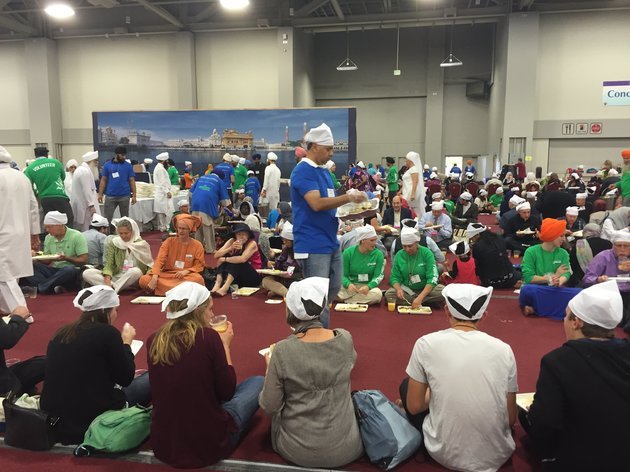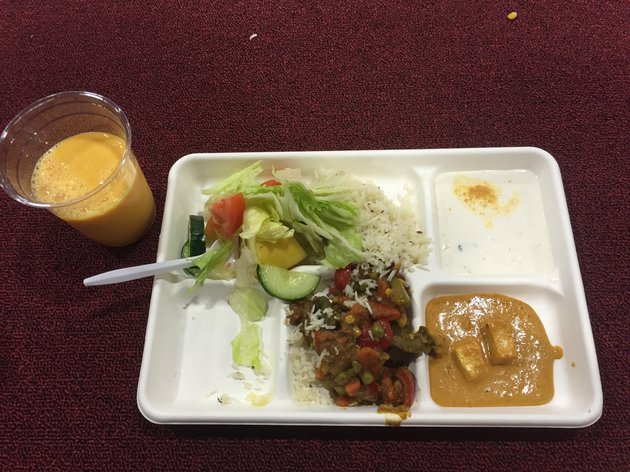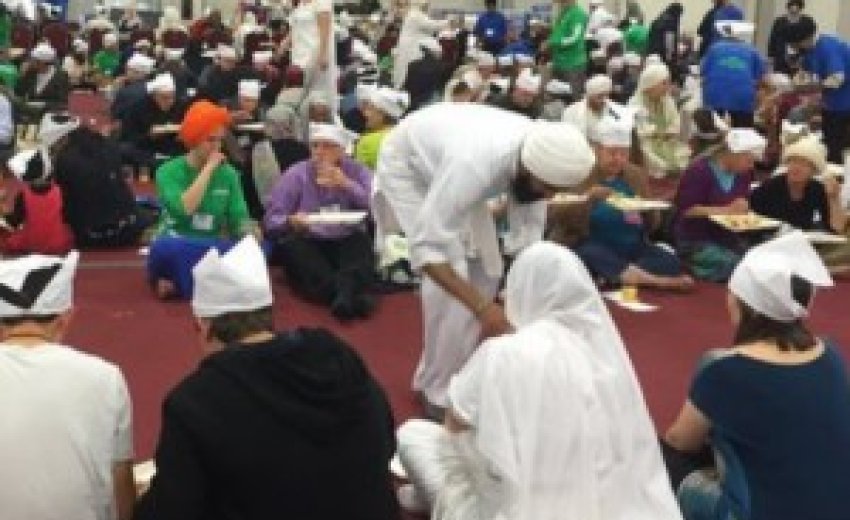"We’re all equal before God."
10/17/2015: The scent of curry wafted from a conference hall in Salt Lake City, Utah, Saturday as thousands lined up for a free meal at the Parliament of the World’s Religions, an international gathering that, every five years, brings together thousands of people from different religious and spiritual traditions.
Nishkam Centre, a U.K.-based Sikh organization, hosted the free lunch with the help of dozens of volunteers. The meal, called a langar, is a fundamental component of the Sikh faith and offered diners a taste of worship at its most egalitarian.
 |
| Antonia Blumberg/The Huffington Post Thousands partook of a free langar meal on Saturday, Oct. 17, 2015, during the Parliament of the World's Religions. |
As visitors entered the hall, volunteers instructed them to remove their shoes and make their way to the dining area. There, another set of volunteers approached those whose hair was uncovered and placed a simple white bandana on their heads.
"You are about to eat food that has been blessed, and so we cover our heads out of respect," one volunteer told The Huffington Post.
Geetika Kaur, another volunteer, stood at the front of the line offering a quick explanation of the langar tradition to those about to partake in the feast.
“The gurus started this tradition to say, ‘Regardless of who you are, where you come from, what your background is, you’re welcome into this space,'" Kaur told HuffPost. People are encouraged to break bread together, she added, and "share that common humanity that binds all of us together.”
Langar meals were offered every day of the five-day conference. Amrick Singh Ubhi, the director of Nishkam Centre, estimated that up to 6,000 people had been fed on Saturday alone.
 |
| Antonia Blumberg/The Huffington Post Thousands partook of a free langar meal on Saturday, Oct. 17, 2015, during the Parliament of the World's Religions. |
"Guru Nanak [the founder of the Sikh faith] started the concept of langar and said, 'Share with each other. There is no difference between you; we’re all equals," Singh Ubhi said.
"In modern day terms it is simply a case of equality," he continued. "It doesn't matter if you arrived in your private jet outside or whether you had to scrounge money together to get bus fare to get here. We’re all equal before God."
Once diners got to the front of the line they were invited to sit on the ground and were offered a plate, spoon and cup. One by one, volunteers came by dispensing spoonfuls of vegetable curry, raita, rice and salad from giant buckets. They handed out naan, apple and banana slices and poured generous cups of water and mango lassi. Anyone who desired another helping of food needed only to ask to receive it.
 |
| Antonia Blumberg/The Huffington Post The langar meal included two types of curries, rice, raita (a side dish made from yogurt), salad, naan (an Indian flatbread) and mango lassi. |
"We sit on the floor in order to sit amongst equals," Singh Ubhi said. "It is about keeping good company."
For William Hwang, an educator who lives in San Diego, the langar was more than a shared meal. It was a form of spiritual fellowship that "feeds your body and feeds your soul."
A volunteer approached Hwang at one point and asked if he was done eating. Even though he was, Hwang gripped the plate for a moment, reluctant to be waited on. The volunteer smiled, looked in his eyes and said, "It's okay. Let me serve you."
The experience invoked in Hwang an "instantaneous sense of gratitude," he said.
"In my culture you bus your own tray," Hwang said. He felt grateful, he added, "that someone would say, 'I want to serve you,' and happily do that."
That sense of service and gratitude is at the heart of langar, said Singh Ubhi.
"Everybody that's arriving here is coming with humility, coming to receive something," he said. "But the people serving are also doing so with utter humility because they're seeing God in everybody."
Those thousands of people experiencing the langar might share its message of equality with their communities, Singh Ubhi said, and that has a ripple effect that can transform the world.
---------------------------------------------------------------------
Related Article:
